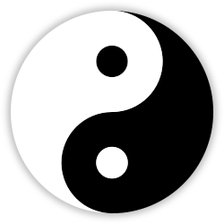
Ineffable
The Way that can be told of is not an unvarying way;
The names that can be named are not unvarying names.
It was from the Nameless that Heaven and Earth sprang;
The named is but the mother that rears the ten thousand creatures, each after its kind.
These are the famous first lines of the Tao Te Ching, stating that the Tao is "ineffable, nameless, goes beyond distinctions, and transcends language." We saw last week in my examination of the Upanishads that this kind of slipperiness of thought may be useful to keep the critics at bay, and while it can help to elicit humility, it also lacks the ability to promote necessary progress. While I appreciate this attempt at balance between black and white (that are really shades of gray) in comparison to the separation into black and white that is common in Judeo-Christian origins, a la the 10 Commandments, I find that these eastern traditions go too far, promoting a "certainty of uncertainty" that is wrong, maddening, and wasteful towards opportunity. This is a common theme among Asian wisdom traditions though, and unfortunately it will come up again in my critiques of Buddhism and Confucianism. For a sad look at how this has carried through to modern times, suffer through this video of last week's debate between Richard Dawkins and Deepak Chopra. Contained within the Tao though is possibly the original and primary example of this philosophical vacuity.
Emptiness
We put thirty spokes together and call it a wheel;
But it is on the space where there is nothing that the usefulness of the wheel depends.
We turn clay to make a vessel;
But it is on the space where there is nothing that the usefulness of the vessel depends.
We pierce doors and windows to make a house;
And it is on these spaces where there is nothing that the usefulness of the house depends.
Therefore just as we take advantage of what is, we should recognize the usefulness of what is not.
Circumference, area, volume, and space, are not 'things that are not'. Failure to see this should not demean the sight of other worthwhile works. Taking advantage of what there is though, here is what I recognised as what is useful and what is not within the general writings of the Tao.
------------------------------------------------------------
Lao Tzu and the Tao Te Ching (~600 BCE) traditionally considered the foundation of philosophical Taoism. According to Chinese traditions, Lao Tzu lived in the 6th century BCE. By the mid-twentieth century a consensus had emerged among scholars that the historicity of Lao Tzu was doubtful or unprovable and that the Tao Te Ching was a compilation of Taoist sayings by many hands.
Survives
According to the Tao Te Ching, humans have no special place within the Tao, being just one of its many manifestations. People have desires and free will and thus are able to alter their own nature. This is correct.
Needs to Adapt
Many people act "unnaturally," upsetting the natural balance of the Tao. The Tao Te Ching intends to lead students to a return to their natural state, in harmony with Tao. Technology may bring about a false sense of progress. The answer provided by Lao Tzu is not the rejection of technology, but instead seeking the calm state of wu wei. Wu wei, literally "non-action" or "not acting," is a central concept of the Tao Te Ching. The concept is very complex and reflected in the words' multiple meanings; it can mean not doing anything, not forcing, not acting (in the theatrical sense), creating nothingness, acting spontaneously, and flowing with the moment. It includes the concepts that value distinctions are ideological and seeing ambition of all sorts as originating from the same source. Lao Tzu used the term broadly with simplicity and humility as key virtues, often in contrast to selfish action. On a political level, it means avoiding such circumstances as war, harsh laws and heavy taxes. Some Taoists see a connection between wu wei and esoteric practices, such as the "sitting in oblivion," emptying the mind of bodily awareness and thought. Many people do upset the world with their actions, but the “natural state” of humans and animals is not something that should be returned to. The natural state was characterized by heavy competition, which required short-term-focused actions just to stay alive. Humans face little competition anymore except among themselves. It is time to progress to a cooperative long-term focus. That is the true way. That will not look like sitting in oblivion, but it will involve falling into the flow states described by positive psychology. The political suggestions are correct, but do not go far enough to explain the true purpose of government - the correcting of markets so as to ensure progress towards the survival of the species.
Gone Extinct
The numerous passages of the Tao Te Ching are ambiguous, and topics range from political advice for rulers to practical wisdom for people. Because the variety of interpretation is virtually limitless, not only for different people but for the same person over time, readers do well to avoid making claims of objectivity or superiority. This kind of ambiguity must be clarified. The claims of subjectivity over objectivity are the claims of the relativistic nihilist. As living things, the long-term survival of life is an objective good. Everything else flows from this.

